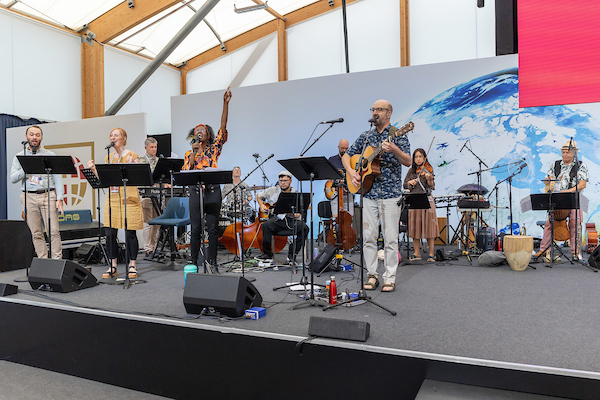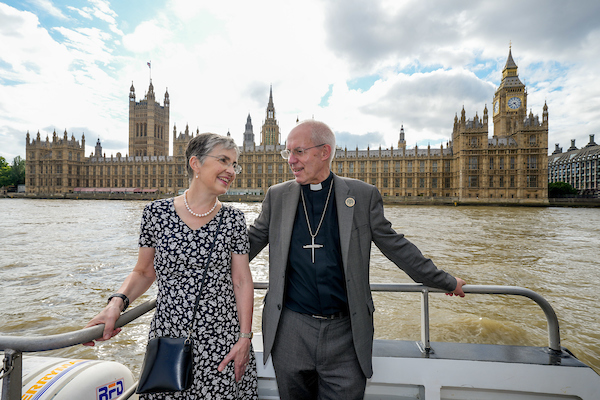Now that the 2022 Lambeth Conference is over, and Clare and I are back in Edinburgh, here are ten of my takeaways from the event.
- Lanyards. You had to wear your lanyard. Without it you were treated like the badly dressed wedding guest in the parable, cast into outer darkness. Your lanyard carried your photo and your name, which meant that you greeted people not by looking them in the eye but in the belly-button.
- Queues. But your lanyard didn’t allow you to jump the queue. Sometimes I queued for 50 minutes to get my lunch. This, admittedly, is a bit of a first world problem because there was no shortage of food once we got to the head of the line. And I met some amazing people on the way.
- Laughter. Some cultures really know how to smile; others know how to laugh. Laughter isn’t the same as joy, but it can remind us what joy feels like.
- The Lord’s Prayer. The Anglican Communion is increasingly multi-lingual. Every time we said the Lord’s Prayer we said it in our own language. A holy susurration, praying for God’s kingdom to come, God’s will to be done. A Pentecostal experience… three times a day.

- Music. Some who worship God with classical music, others with a praise band. At Lambeth we learned how both can be combined in the same service, in the same ensemble. Pete Gunstone and his talented collection of friends brought us the rhythms and tempos of music from across the world, and made both the Cathedral and the large sports hall where we gathered most days ring with joy. Sublime.
- South Sudan. The Nigerians, Ugandans and Rwandans didn’t come to Lambeth, the South Sudanese bishops did. 59 of them out of 67. Each one telling of their personal and daily experience of exile, war, terrorist threat and extreme poverty, frequently leaving me incapable of speech. Like the majority of the Anglican Communion, they don’t agree with us about marriage, but they were there, in the room with us, that was the important thing. And boy did they shine.
- Stewards. Bishops come in all shapes and sizes, and there are some very special people amongst them. But they do, most of them, tend to be on the upper side of fifty. So, it was great to have loads of much younger volunteers around; vigorous, enthusiastic and always on hand to help. I passed a group of them wandering home one evening. ‘Surely global warming is a much more important issue than same-sex marriage’, one was saying. ‘Where on earth did you get that idea?’ I asked… I think they knew I was joking.
- Spouses. If the Anglican Communion were simply a Western affair a spouses event might be considered self-indulgent. Yet, in truth, wherever you live, when your husband or wife becomes a bishop your life is significantly altered and you can find your own faith tested to its limit. Maybe in the future spouses won’t be invited to Lambeth, but this time round I’m very pleased they were. Spouses from the two-thirds world, in particular, very much needed a treat, a chance to rest, an opportunity to find companions and food for their souls.
- Fire Alarm. Yes, we had one in our block. 5.30am and 80 bishops and spouses out on the grass, bleary-eyed. One or two had obviously delayed their escape to shower and apply makeup. And a surprising number had hastily grabbed a purple shirt to hide their confusion. Unless it’s really true, that some clergy go to bed in their clerical collars.

- Justin and Caroline Welby. This was Justin Welby’s conference. His personality dominated it and he and Caroline had worked immensely hard over 9 years to make it the hospitable and joyful event it became. Will the Anglican Communion hold together over the issue of marriage and sexuality? Well, we have to wait and see. But the Archbishop’s contribution has given it every chance. No new resolution about what marriage is but no sanctions either on those whose faithful decision puts them out of step with the majority. It was, for me, a vital reaffirmation of what the Anglican Communion is about. I got the feeling that those who came to Lambeth can live with this – those who refused to come may take a different stance. But this is something on which the younger generations, even in very conservative cultures, will eventually have their own say.
